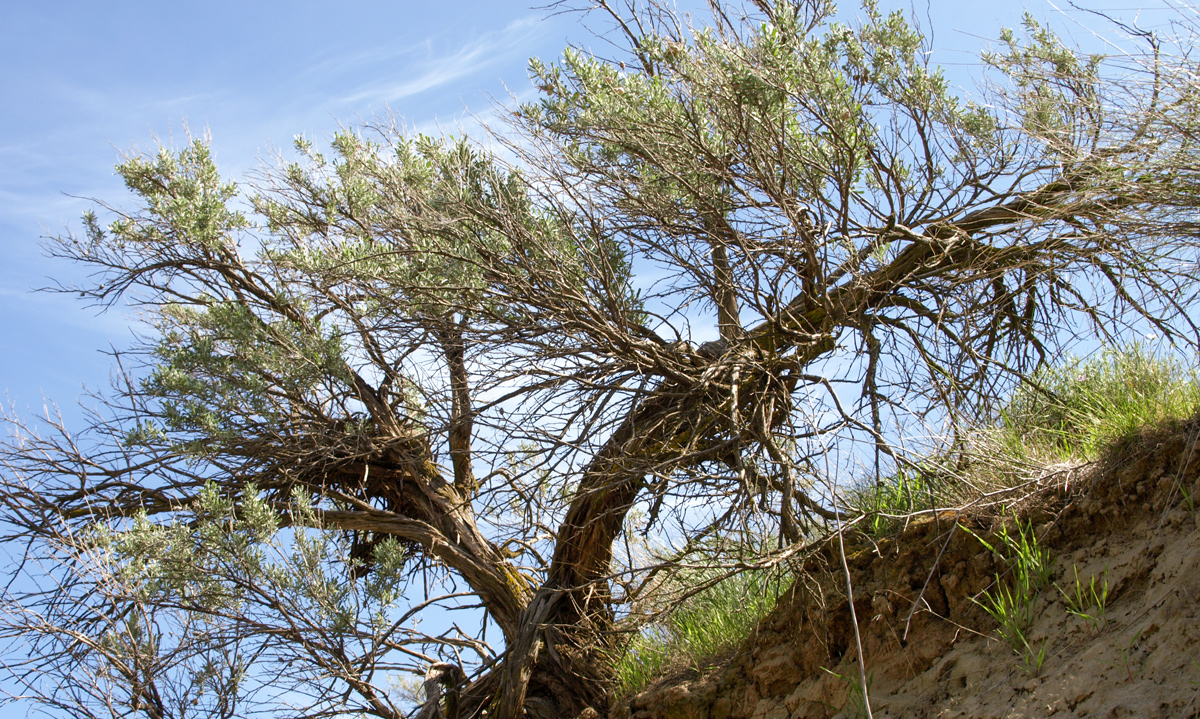The boats make fourteen miles up the Missouri River reaching the area of present Bear Den Creek, North Dakota. Along the way, they pass sage-covered hills with prairie dogs, elk, buffalo, and two empty Assiniboine camps.
Evidence of Spiritous Liqour
by Yellowstone Public Radio[1]Originally aired weekdays by Yellowstone Public Radio during the Bicentennial observance of 2003-2006. Narrated by Hal Hansen. Scripts by Whit Hansen and Ed Jacobson. Produced by Leni Holliman. © … Continue reading
A Skin Lodge of an Assiniboin Chief
Karl Bodmer (1809–1893)
Rare Book Division, The New York Public Library.[2]“Lederzelt eines Assiniboin Chefs. Tente en cuir d’un chef Assiniboin. A skin lodge of an Assiniboin chief.” New York Public Library Digital Collections. Accessed March 14, 2019. … Continue reading
Assiniboine Camps
[I]n the plains [Clark] met with the remains of two large encampments of a recent date, which from the appearance of some hoops of small kegs, seen near them we concluded that they must have been the camps of the Assinniboins, as no other nation who visit this part of the missouri ever indulge themselves with spirituous liquor.
—Meriwether LewisThose lodges or tents are made of a number of dressed buffalow Skins Sowed together with Sinues & deckerated with the tales, & Porcupine quils
—William Clark
Prairie Dog Town
near the place we dined on the Lard. side, there was a large village of burrowing squirrels. I have remarked that these anamals generally celect a South Easterly exposure for their residence, tho’ they are sometimes found in the level plains.—
—Meriwether Lewis
Sagebrush Country
Big Sagebrush
Artemisia tridentata
Location: Walla Walla River, 18 April 2009. © by Kristopher K. Townsend. Permission to use granted under the Creative Commons Attribution-Share Alike 4.0 International license.
on these hills many aromatic herbs are seen; the one resembling the camphor in taste and smell, rising to the hight of 2 or 3 feet; the other about the same size, has a long, narrow, smooth, soft leaf of an agreeable smel and flavor; of this last the Atelope [Pronghorn] is very fond; they feed on it, and perfume the hair of their foreheads and necks with it by rubing against it.
—Meriwether Lewis
Other Sightings
Weather Diary
State of Thermometer at rise
Weather Wind at rise
State of Thermometer at 4 P.M. Weather Wind at 4 P.M. State of the River 52 [above 0] cloudy S E 82 [above 0] fair S. W. fallen ¾ in. —William Clark and Meriwether Lewis[3]To assist the reader, the editor of this web page has omitted the date column, clarified the “State of the River” information, and spelled out some abbreviations.
Experience the Lewis and Clark Trail
The Lewis and Clark Trail Experience—our sister site at lewisandclark.travel—connects the world to people and places on the Lewis and Clark Trail.
Plan a trip related to April 14, 1805:

Notes
| ↑1 | Originally aired weekdays by Yellowstone Public Radio during the Bicentennial observance of 2003-2006. Narrated by Hal Hansen. Scripts by Whit Hansen and Ed Jacobson. Produced by Leni Holliman. © 2003 by Yellowstone Public Radio. |
|---|---|
| ↑2 | “Lederzelt eines Assiniboin Chefs. Tente en cuir d’un chef Assiniboin. A skin lodge of an Assiniboin chief.” New York Public Library Digital Collections. Accessed March 14, 2019. https://digitalcollections.nypl.org/items/510d47da-c3fe-a3d9-e040-e00a18064a99. |
| ↑3 | To assist the reader, the editor of this web page has omitted the date column, clarified the “State of the River” information, and spelled out some abbreviations. |


